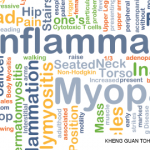They compared the immune system profiles of 31 European American, ANA-positive, healthy individuals with those of 31 patients with active SLE not on immunosuppressive therapy and 31 ANA-negative controls matched for age, sex, race and body mass index. They found the ANA-positive, healthy individuals had a unique serum cytokine profile: inflammatory cytokines similar to the lupus patients and levels of suppressive cytokines even lower than in ANA-negative individuals. BLyS levels were elevated in the lupus patients and lower in the healthy controls, but BLyS levels were even lower in the ANA-positive, healthy individuals.
“When we compared IL-1 receptor antagonist panels, one of our most striking findings was that ANA-negative, healthy individuals tended to have lower levels of IL-1RA, and lupus patients had levels in the middle, but ANA-positive, healthy individuals have really elevated levels,” she said. “This makes for an interesting pathway to consider and one that ANA-positive, healthy individuals may use to suppress the transition to full-blown disease.”
Could any autoantibodies protect ANA-positive individuals from transition to lupus? Recent research suggests anti-DFS70 antibodies, or dense-fine speckled autoantibodies that bind to the lens-epithelium-derived growth factor, a stress survival protein, protects the immune system from environmental stressors.16 In a 2018 study of sera from 1,758 individuals, researchers found anti-DFS70 autoantibodies were highly enriched in healthy people and are typically negatively associated with systemic autoimmune disease development, said Dr. James. 17
Is Hydroxychloroquine Protective?
Lupus researchers want to identify any potential early interventions that may prevent disease onset in at-risk individuals. When Dr. James’ team first analyzed the military repository cohort, they documented which individuals had ever received hydroxychloroquine or chloroquine before meeting ACR SLE classification criteria compared with those who had not received these anti-malarial drugs.
“If we looked at time to diagnosis, there was actually a time delay to developing lupus in the group who were treated with hydroxychloroquine compared with those who were not. At the time, I was a little concerned people were being put on hydroxychloroquine because they had lupus symptoms, but some were put on chloroquine because of where they were deployed. We went back and looked at accrual of autoantibodies between those two groups,” said Dr. James.
Accrual of autoantibodies was lower, and then plateaued, in individuals who had received hydroxychloroquine compared with those who did not take the drug. Hydroxychloroquine treatment prior to SLE diagnosis was also associated with a longer mean time between first clinical symptom onset and diagnosis.18

